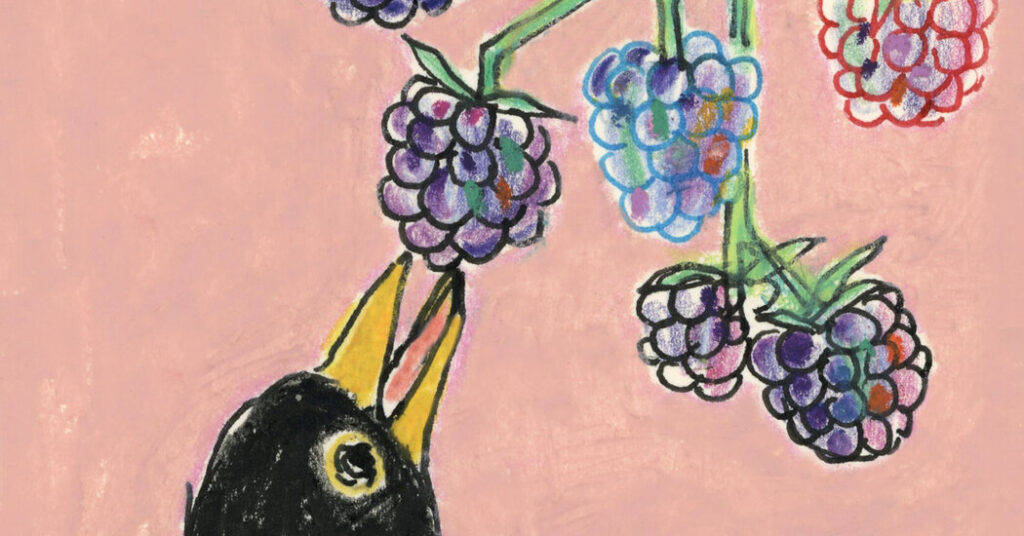Forget about apples and oranges — nothing rhymes with orange anyway. Never mind those plums that William Carlos Williams sneaked from the icebox. The most poetic fruit of all is the blackberry.
Not the mushy sugar bombs packed into plastic clamshells at the supermarket. Those are insipid, bland, prosaic. I mean the ragged, spicy volunteers that grow untended at the edge of a meadow or the side of a road. The kind you go out and pick in late summer or early fall.
You’d be amazed at how many of those end up in poems. Poems with blackberries in the title; poems fascinated by the word blackberry; poems that celebrate the berries’ texture and flavor; poems that associate them with death or the loss of innocence. Especially among English-language poets active since the middle of the last century, there is a pronounced taste — a passion, a mania — for blackberries.
What is it about the humble rubus that inspires such ardor? We could start by asking Galway Kinnell, a notable bard of the blackberry.
Kinnell offers a kind of master class in blackberry poetics, synthesizing themes that sprout separately in the work of other poets: pleasure and danger; the passage of time; the power of language.
Robert Hass is, like Kinnell, a student of blackberry linguistics. In “Picking Blackberries With a Friend Who Has Been Reading Jacques Lacan” — a French psychoanalyst notorious for his counterintuitive theories of language — the friend winds up with his “beard stained purple / by the word juice.”
Another blackberry poem of Hass’s, “Meditation at Lagunitas,” ponders the mysteries of meaning:
because there is in this world no one thing
to which the bramble of blackberry corresponds,
a word is elegy to what it signifies.
He concludes with an incantation, distilling the fruit into pure language.
Such tenderness, those afternoons and evenings,
saying blackberry, blackberry, blackberry.
Other poets insist on the importance, literal and symbolic, of actual blackberries. In a rambling meditation called “The Walk,” James Schuyler asks:
Remember
when you picked
them?
And many poets do.
The juice of the berries colors their memories.
They left my hands like a printer’s
Or thief’s before a police blotter
So begins Yusef Komunyakaa’s “Blackberries.” His 10-year-old self, eating half his haul and saving the rest to sell on the roadside, encounters humiliation, longing and a blunt reminder of the world’s unfairness when he sees himself through the eyes of wealthy children riding past in a car.
Seamus Heaney’s “Blackberry-Picking,” about foraging with his childhood friends in the Northern Irish countryside, follows a similar trajectory. Stained hands and sweet berries give way to disappointment:
I always felt like crying. It wasn’t fair
That all the lovely canfuls smelt of rot.
Each year I hoped they’d keep, knew they would not.
Those blackberries impart a somber lesson. Loveliness is not meant to last.
Grownup pickers in poems by Richard Wilbur and Margaret Atwood have absorbed such knowledge. Atwood shares the wisdom of old age with a younger berry-picker:
That’s good times: one little sweetness
after another, then quickly gone.
A blackberry, arriving late in summer, brings news of mortality — an omen, to Wilbur:
that a night may come in which, some say,
We shall have only blackness to behold.
Such fatalism is part of the berry’s allure. While we can certainly savor poems, like Mary Oliver’s “August,” that celebrate the simple joys of blackberrying — “there is / this happy tongue,” she exults in the last line — a thornier strain grows thicker. Call it Dark Blackberry.
Sylvia Plath, following a path to the ocean in “Blackberrying,” leads us through a landscape both fruitful and terrifying. She renders our favorite fruits with vivid, witchy intensity (brandishing a shiny poetic synonym for “black”):
Big as the ball of my thumb, and dumb as eyes
Ebon in the hedges, fat
With blue–red juices. These they squander on my fingers.
I had not asked for such a blood sisterhood; they must love me.
Blackberries crop up in poems as metaphors and memories, and sometimes just as words, but Plath’s — like Kinnell’s when they drop “unbidden” into his mouth — seem to belong to a wilder species, possessing desires and feelings of their own. But neither Plath nor Kinnell thinks too much about what those desires and feelings might be.
Modern poets dwell on what it means to pick blackberries, and what it’s like to eat them. But who speaks for the blackberry?
Emily Dickinson.
Dickinson, arguably the greatest nature poet (and religious poet and love poet) of the American 19th century, didn’t just observe the flora and fauna around her. She treated them — birds and bugs, flowers and snakes — as fellow creatures, characters in the tragicomic pageant of life and death. To her, a blackberry is a living, suffering being.


